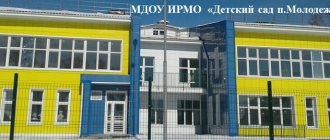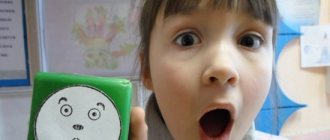Speech therapy centers and clinics in many European countries cannot cope with the number of children. According to statistics, currently about 25% of 4-year-old children suffer from severe speech impairments (for comparison, in the 70s this figure was 4%). Thus, the issue of increasing the effectiveness of correctional work with children who have deviations not only in cognitive but also in speech development is becoming increasingly relevant.
Also L.S. Vygotsky noted that a defect in some analyzer or intellectual defect does not cause an isolated loss of one function, but leads to a whole series of deviations. That is, there are no speech disorders in which, due to the presence of intersystem connections, other psychological disorders would not be noted. Together they form a complex psychological profile of deviations in mental development in children, in the structure of which one of the leading syndromes is speech disorders.
Deviations in speech development and conditioned speech difficulties are often accompanied by a decrease in the child’s cognitive activity, insufficient orientation in the facts and phenomena of the surrounding reality, and impoverished content of communicative, gaming and artistic and creative activities.
Children with speech therapy problems with normal intelligence often experience a decrease in cognitive activity and the processes included in its structure:
- less volume of memorization and reproduction of material;
- instability of attention;
- quick distractibility;
- exhaustion of mental processes;
- reduction in the level of generalization and comprehension of reality;
- developed coherent speech is difficult.
From the emotional-volitional sphere, the following are often observed:
- increased excitability;
- irritability or general lethargy;
- isolation;
- touchiness;
- tearfulness;
- repeated mood changes.
In this regard, the relevance of the interaction between a teacher-speech therapist and a teacher-psychologist of a preschool educational institution in solving speech and related psychological problems of children of senior preschool age is obvious.
Our experience
Based on the current situation, we, together with a preschool psychologist, decided to develop a project , the purpose of which is to create and test a model of interaction between a speech therapist and a psychologist in the process of correctional and developmental educational activities that stimulate the speech, cognitive and personal development of the child.
- First stage
The initial stage of the work was to determine the methodological basis on which we plan to rely during the implementation of the project. When identifying the criterion for forming a group of children participating in the project, we decided that we would consider speech and sound pronunciation defects to be primary for organizing correctional and developmental work.
Having analyzed the available literature, we came to the conclusion that there is insufficient methodological development of the issue of organizing joint work between a psychologist and a speech therapist within the framework of a preschool educational institution. Also, at present, there are discrepancies in the understanding of the form of organizing the integrated work of specialists. In modern periodicals, in particular in the magazines “Speech therapist in kindergarten”, “Directory of a senior teacher of a preschool educational institution”, etc., the interaction between a speech therapist and a psychologist is based on conducting integrated, i.e. joint activities with children. All notes are structured in such a way that there are remarks and tasks from a speech therapist, and there are parts of the lesson that are conducted by a psychologist. Thus, two specialists simultaneously work with children.
The advantage of this form of work organization is that the speech therapist controls sound pronunciation throughout the entire lesson, and the psychologist at this time works on the development of cognitive processes. But there is also a significant disadvantage - the irrational use of specialists’ working time.
Another approach involves conducting separate, parallel work on the same lexical material. Those. some exercises are carried out by a speech therapist, and some by a psychologist, but taking into account the lexical material proposed by the speech therapist. The advantage of this approach is a more rational use of specialists’ working time.
We chose the option of parallel work by a psychologist and a speech therapist on the same lexical material, with final integrated classes held once a month.
- Second phase
The next stage of our work on the project was the creation of a single file of tasks that both a speech therapist and a psychologist could use in their work. We systematized and designed tasks for the development of memory, thinking, attention, and perception using specially selected lexical material aimed at automating a specific sound. In our file cabinet there are tasks for automating the sounds [L'], [S] [S'] [Z] [Sh] [R] [R'], etc. As an example, we will give tasks from the file cabinet selected to automate the sound [L ].
Summary of psychological and speech therapy classes in a senior speech therapy group
Summary of a psychological and speech therapy lesson with children of the senior speech therapy group of the first year of study with elements of psychological training
Author: Vlasova Taisiya Vyacheslavovna, teacher-speech therapist MBDOU CRR - kindergarten No. 42 “Rodnichok” Moscow region, Vidnoye Description of the material:
Material is provided for use in the work of preschool educational institutions specialists: speech therapist and educational psychologist.
This summary shows a possible form of the lesson. In our work, we prefer to interact with each other for the successful dynamics of speech and emotional-volitional development, especially when working with children with special needs development disorders. Goals:
Psychological: 1. Give children an idea of understanding the options for interaction in various situations;
2. Develop communication skills between children. Speech therapy: 1. Enrich vocabulary on the topic “Winter”. 2. Develop facial muscles and the condition of blood vessels and tissues of the peripheral speech apparatus. 3. Develop fine motor skills. Material for the lesson:
Class symbol “Poofa”, audio recording of funny children's songs.
Progress of the lesson
(Children stand in a circle on the carpet)
Psychologist: Exercise “My mood” - Children, good morning! I want to know what your mood is today and what it's like right now, at this time. To do this, I will give each of you Poof, and you tell me what your mood is and what it looks like. Don’t forget, when Poof is in your hands, only you speak, and the others are silent and listen carefully. So here we go. Ira, please. (Children take turns passing the symbol of the activity to each other, talking about their mood) Psychologist: Exercise “Following the Footsteps” Great. Now we know who is in a good and cheerful mood, and who is a little sad. And in order to make our general mood wonderful, we will play with you a game called “Following the Footsteps.” We listen to me carefully. Let's hold hands and line up in a single chain. The footprints are laid out in front of you. You need to, slowly, without words, follow these tracks, stepping only on them. If someone from the team steps off the edges of the tracks, we start over. We complete the task until all the children have walked the path of footprints correctly. (Paper traces are prepared and laid out in a path. Children complete the task.) (Children sit on the carpet, next to there is an easel with a picture of a winter landscape) Speech therapist: Children, look carefully at the board and tell me, please, what time of year is it? (children's answers) What signs of winter do you know? (children's answers) Well done! The most important sign of winter is white, fluffy snow. I suggest you now do a “Snow” self-massage on your face. (G.A. Osmanova, L.A. Pozdnyakova. Game speech therapy massage and self-massage in the correction of speech disorders. - St. Petersburg: KARO, 2013. - P.53-55) Self-massage of the face “Snow” They cannot slide without it (Stroke forehead with both hands from the middle to the temples) Skis (Rub the forehead with vertical movements of the index fingers (in the opposite direction) Sleds (Rub the forehead with horizontal movements of the index fingers) And skates, (Rub the forehead with spiral movements of the index and middle fingers from the middle to the temples) And they don’t look like winter (Stroke the cheeks in the direction from the nose to the ears along the massage lines) These winter days! (Tap your fingers, gathered in a pinch, on the cheeks) The earth will hide from the frost (Stroke the chin with the back of your hands from the middle of the chin to the earlobes) And will please us all ( Pinch the chin from the middle to the ears) Soft, (Press with your index fingers on the upper lip from the middle to the corners) White (Press with your index fingers on the lower lip from the middle to the corners) And fluffy (Rub the lips with spiral movements from the middle of the upper through the corners to the middle of the lower) The long-awaited first snow. (Stroke the forehead, cheeks, chin) Psychologist: Exercise “Cockerels” And now we will imagine that our boys have turned into cockerels. I need to select two players. (The counting is said 2 times) The bees flew into the field, They buzzed, they hummed, The bees sat on the flowers, We are playing - you lead. (O.N. Kozak, “Whatever the child amuses himself with. Counting books, teasers, world games.” - Rostov n/d: “Phoenix”, St. Petersburg: “Soyuz”, 2004. - P. 10) Kolya and Seryozha, imagine that you are cockerels, but not ordinary ones. You will need to stand opposite each other and jump on one leg, while clapping one palm against the palm of the player opposite. Those who cannot stand on one leg leave the game and cheer for their friends. At the end, the winner of the game remains. (Children complete the task.) Speech therapist: Well done, you played well, and now let’s remember what the main winter holiday happens at this time of year? (children's answers) Guess the riddle “In winter and summer - in one color.” (children's answers) That's right, and around the New Year's tree the children dance in a circle. And now you and I will have a New Year's round dance in the palm of our hands. (G.A. Osmanova, L.A. Pozdnyakova. Game speech therapy massage and self-massage in the correction of speech disorders. - St. Petersburg: KARO, 2013. - P.56) Development of fine motor skills “New Year’s round dance” We came to the winter tree (Stroke the left palm and draw a Christmas tree on it with the index finger of your right hand) Hares, squirrels, foxes, wolves. (Rub each finger of your left hand from tip to base, starting with the little finger) So we met each other, (Rub the thumb of the left hand from tip to base, clench your hand into a fist) But they weren’t scared at all. (Bend the fingers of your left hand one at a time, starting with the little finger) Together they stand in a round dance, (Knead your left palm with the thumb of your right hand in a spiral) To celebrate the New Year. (Finger “shower” on the palm, and then fold your hands in a “Christmas tree”) (Perform self-massage on your right hand) Psychologist: Exercise “We are a couple” How well done you are today! Now you will be divided into pairs, but first you need to divide into “First” and “Second”. Masha, start. (Children are counted) The first numbers go to Taisiya Vyacheslavovna, and the second ones stay with me. Those who stand opposite you are your pair in the next game. When the music starts, you begin to disperse throughout the group. As soon as the music ends, I count to three, and you quickly need to find your partner and take their hand. So here we go! (Music plays, children disperse into the group. The game is played several times.) Speech therapist: Children, you are great today! Psychologist: We really enjoyed today’s lesson. What did you like about the lesson? (children's answers) Speech therapist: Thank you very much! The lesson is over.
We recommend watching:
Experience as a teacher psychologist with children of preschool and primary school age
Summary of joint activities of a teacher-psychologist with children of the preparatory group “Journey to the Psychological Tournament for Schoolchildren. Abstract A set of exercises for preschoolers to develop the correct pronunciation of the sound P
Similar articles:
Training session with students aged 10-12 years “Tree of Tolerance”
Psychology lesson in grades 1 and 2 “Boys and girls”
Poems about overcoming emotional states
Psychological training for teachers
Corrective and developmental activities for children with disabilities
Examples of exercises for practicing sound [L]
Developing the ability to find an extra object, we offer children the following task: repeat the words, find the extra word, explain why it is extra. Example: falcon, goldfinch, bow, nightingale. There is an extra onion, because it is a vegetable, and everything else is birds. "Elk, horse, lily of the valley, buffalo." “Boat, shelf, table, chair.” “Salad, chalk, chocolate, kalach.” "Pilot, diver, lamp, cyclist."
Children are of great interest in tasks in which it is necessary to correct errors in the construction of sentences. For example, we invite children to listen to sentences in which the words are mixed up and correct the mistakes, highlighting the sound L: “A flowerbed appeared on the gladioli.” “The Christmas tree walked near the elk.” "The white sky floated on a blue cloud." “The salad was sticking out of the spoon.” "The horse galloped on its rider." “The elephant painted the artist”, etc.
During correctional and developmental work, we actively use proverbs and sayings for a specific sound. For example, to automate the sound [L], you can use proverbs such as “Where there are many words, there is little action”; “He who is brave is safe”; “The wolf catches, and the wolf is caught”; “Gold will not become gold until it has been under the hammer”; “He who didn’t start anything, didn’t do anything!” and others. Proverbs can be used, for example, in the game “Password”, aimed at developing voluntary auditory memory.
Tasks for the development of verbal and logical thinking, training the ability to classify objects, select analogies, and for the development of visual and auditory perception and attention were selected in a similar way.
During the project, we also use games and exercises developed by A.L. Sirotyuk (cross movements, finger games, oculomotor exercises, kinesiological complexes). These exercises are aimed at developing interhemispheric interaction. Neurophysiologists have proven that with regular performance of this set of exercises, a large number of nerve fibers are formed that connect the hemispheres of the brain, which contributes to the development of higher mental functions.





